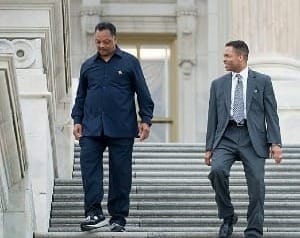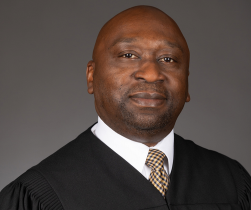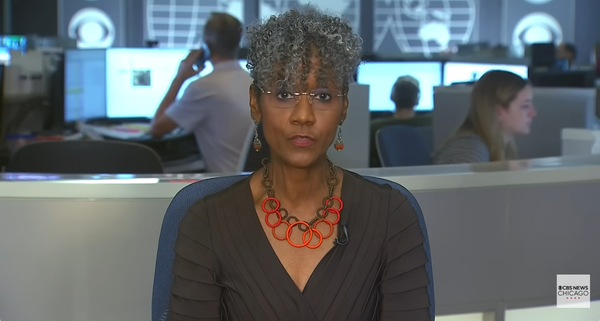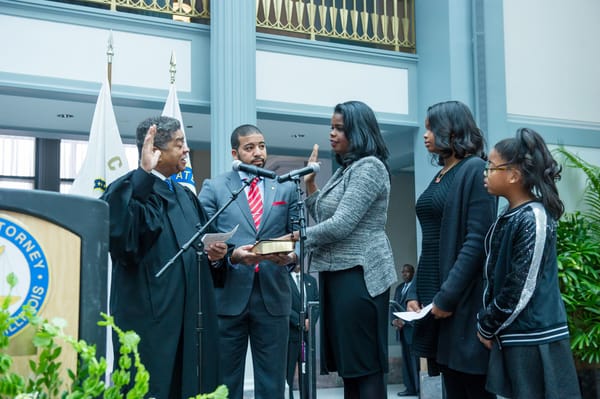Appellate justices reverse circuit court; vacate Kevin Jackson conviction
An appellate court panel on Friday reversed a circuit court judge’s ruling to uphold the 21-year-old criminal convictions of Kevin Jackson.
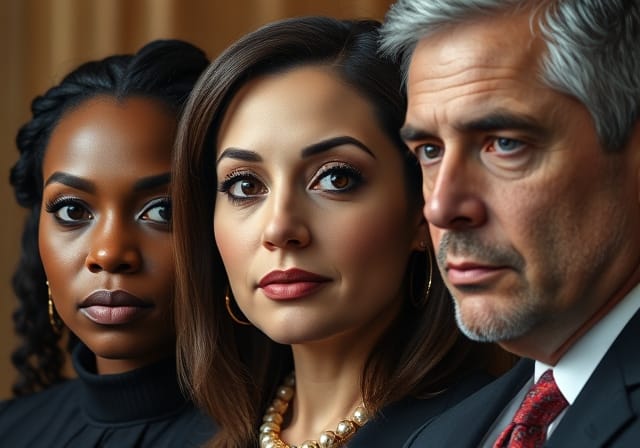
Reversal based on new evidence of police coercion, faulty forensic interpretation
An appellate court panel on Friday reversed a circuit court judge’s ruling to uphold the 21-year-old criminal convictions of Kevin Jackson even though a 2023 investigation found that the state's case was flawed due to police coercion and misleading statements prosecutors made to the jury during the trial.
In 2003 Jackson was convicted of first-degree murder and aggravated assault using a firearm even though all four trial eyewitnesses for the state recanted their out-of-court statements; the bullet-trajectory didn't line up with their statements; and a surviving witness said that Jackson wasn't the gunman. Earlier this month, the three-judge panel ordered the release of Jackson, who had been incarcerated for 23 years, pending its review on whether the circuit court abused its discretion.
Their decision comes four weeks after oral arguments where prosecutors asserted that the judge had discretion to uphold Jackson’s convictions even though the state signaled that it wouldn't seek to retry him.
"Everything about this case has been extraordinary — from the troublingly thin evidence upon which Mr. Jackson was convicted, to the disturbing facts that have been uncovered regarding the tactics employed by the detectives in this case, to the state publicly taking the position that it does not oppose the extraordinary relief that Mr. Jackson seeks and that it would not retry Mr. Jackson for these crimes," the appellate panel, led by Justice Mary L. Mikva, wrote.
Third time is the charm
Jackson twice filed post-conviction pleadings. But his arguments that detective Brian P. Forberg coerced witnesses, including telling them their children would be taken if they didn't provide a statement implicating Jackson, as well as faulty interpretations of the forensic evidence, failed to gain traction in the circuit court and were rejected by appellate and supreme court panels.
But after Jackson's attorneys advised state prosecutors of a conflict of interest — Forberg was married to a prosecutor who worked in the post-conviction review unit — the Cook County State's Attorney's Conviction Integrity Unit in September 2022 hired a team of outside lawyers to reinvestigate the case.
After reviewing the paper record, interviewing witnesses and consulting with independent experts, the special prosecutors, in an August 2023 report, determined there wasn't enough evidence to support the conviction. The report also revealed evidence of similar misconduct by Forberg in other criminal cases that resulted in convictions and lengthy sentences.
Despite these findings, the then-head of the CIU Nancy Adduci advised that the reinvestigation showed nothing new. Jackson's attorneys filed a freedom of information act request for the report, but the Cook County State's Attorney's Office denied the request, Jackson’s attorney Elizabeth Bacon of Brooks, Tarulis & Tibble said, citing the "deliberative work product" privilege. Eventually Bacon and her colleague received a heavily redacted copy. They then filed a motion to compel the state to release an unredacted copy.
But Circuit Court Judge Angela M. Petrone received a copy of the unredacted report. Before ruling on defense counsel's motion to receive the unredacted report, at a hearing in June 2024, Petrone said there was no exculpatory evidence in it and that the convictions should stand.
The appellate panel didn't agree.
"[W]e find that the circuit court abused its discretion in the manner in which it considered Mr. Jackson’s petition," it wrote.
"[W]e further find that any reasonable jurist reviewing the record in this case, Mr. Jackson’s petition, the unredacted reinvestigation report, and counsel’s arguments based on that report, would conclude by a preponderance of the evidence that there are facts that, if known at the time of Mr. Jackson’s trial and direct appeal, would have prevented his convictions."
The case
State prosecutors said that Jackson was the gunman at a 2001 gang turf shooting that left one man dead. They based their theory on the out-of-court statements Forberg secured from four eyewitnesses, three of whom also made incriminating statements before a grand jury.
But at the 2003 trial, they all recanted, insisting that they had been coerced by the detectives investigating the case into signing statements prosecutors described as "handwritten" but were really prepared by state prosecutors, which identified Jackson as the gunman targeting alleged rival gang member Stanley "Meechie" Watson.
"I just was ready to go because I was harassed … I was three months pregnant. I was going through a lot," Brandy Butler explained at Jackson's trial why she signed the statement. "I’m stressed out still right now to this day ‘cause I lied on him. They had me to lie on him. They told — they coerced me judge, I promise you. They made this story up.… He didn’t do it. He was nowhere around. He was not in the car with us."
Initially the appellate courts disregarded the discrepancy between Butler and the other three out-of-court statements and their trial testimony because "we believed, as the state told the jury in its closing argument, that the recanted statements were corroborated by the forensic evidence," the panel wrote.
But the statements and the evidence didn't line up.
That night Ernest Jenkins drove to a Citgo gas station on Chicago’s South Side. His passengers were Michael Watson and Michael’s nephew, Meechie. The Watsons exited the vehicle to pump and pay for gas.
The gunfire left Jenkins dead and Michael Watson wounded.
Butler's statement said that gunfire came from an alley and was aiming at Meechie. Vernon Clay said the weapon was discharged into the car from the passenger side of the vehicle.
But according to the forensics, the bullets hit Jenkins from the left side of his body, meaning the gunfire came from the driver side of the car and that Jenkins, not Meechie, was the target.
At the 2003 trial, defense counsel chided state prosecutors.
"'I suppose they’re going to argue that he turned his whole body around and was facing the rear so the shots come from the passenger’s side of the car,'" Jackson's defense counsel said.
The jury also sensed that there was something wrong with the state's theory. After deliberating for seven hours, they sent out a note:
“We are ten to two and nobody is changing their mind. What do we do?”
The court told them to keep deliberating. The jury asked to rehear preliminary comments about “using their common sense.” That request was denied. Two hours later at around 9 p.m., they asked, “What is the law for hung jury?” “How long do we stay tonight?” ”How do we sleep?”
The jurors asked for a diagram of the crime scene. The court denied that request. Then they asked for a posterboard, markers and tape. The judge sequestered them for the evening.
Jurors reached a verdict in the following afternoon, finding Jackson guilty of the first-degree murder of Jenkins and the aggravated battery with a firearm of Michael Watson. He was sentenced to concurrent terms of 45 years and six years.
The reinvestigation
To answer questions of a conflict of interest, the Cook County State's Attorney's Office in September 2022 assigned the case to two outside prosecutors and one assistant state attorney. After 11 months, the reinvestigation team concluded that Mr. Jackson’s convictions lacked integrity for several reasons including:
(1) There was “an unacceptably high likelihood that the prior witness statements that form[ed] the sole evidentiary basis for Jackson’s conviction[s] were obtained by pressure, coercion, and overreaching by the police.”
(2) Their polygraph expert had concluded that the police falsely told two witnesses that they had failed polygraph examinations, leading one of those witnesses to identify Jackson as the shooter.
(3) New evidence existed, in the form of the expert reports of Dr. Jack Hietpas and Dr. Joseph Peterson, “that the crime scene investigation was negligently conducted and seriously incomplete,” and that, contrary to what prosecutors repeatedly told the jury, the forensic evidence did not corroborate the witnesses’ recanted statements.
“[T]he shooter was firing from the driver’s side of the car in which the decedent victim was located,” the reinvestigation team wrote in the report based upon its experts’ "firm conclusion from the now-available forensic evidence.”
That “directly contradict[ed] the evidence presented at trial, where Clay, a key prosecution witness, claimed to have seen Jackson shooting into the victims’ car from its passenger side.”
The rebuke
After reviewing the case files, including the unredacted reinvestigation report, Judge Petrone ruled in June 2024 to uphold Jackson's conviction.
But that ruling came before Jackson's counsel had the opportunity to review an unredacted copy of the report.
"It was an abuse of that discretion for the court to rule on Mr. Jackson’s petition before ruling on his motion to compel production of the unredacted report," the panel wrote. "[C]ounsel for Mr. Jackson could not fully frame the issues on behalf of their client where they lacked full access to a report that both the State and the court had."
In its decision Friday, the panel also reversed its own earlier denial of Jackson's petitions for relief.
Jackson's first pro se post-conviction pleading in 2007 failed to gain traction.
Ten years later, Jackson again filed a post-conviction pleading, this time with Bacon, challenging the witness statements and including an exculpatory witness who had refused to provide an incriminating statement.
Despite concerns then from Justice Mikva, the appellate panel majority voted to affirm the lower court's decision.
In its ruling on Friday, the court wrote that special prosecutor findings were key to its decision to reverse its own prior refusal to take up Jackson's appeals.
"[A]dditional evidence has surfaced both that there was another suspect the police never investigated and that the detectives in this case have been accused of intimidating and coercing witnesses in a number of other cases," it wrote.
More than a dozen of these cases resulted in convictions which the defendants also are now challenging from behind bars.
